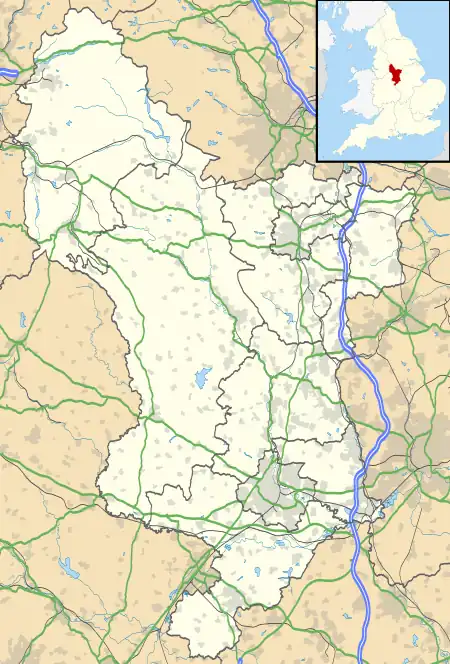| Black Rocks | |
|---|---|
| Stonnis Rocks | |
.JPG.webp) | |
 Location in Derbyshire | |
| Location | Peak District, Derbyshire |
| Nearest city | Cromford |
| Coordinates | 53°05′54″N 1°33′49″W / 53.0982°N 1.5637°W |
| Climbing type | Traditional climbing, Bouldering |
| Height | 5–35 metres (16–115 ft)[1] |
| Pitches | Mostly single-pitch |
| Ratings | Rock grades of Diff to E9 (most are above E1) Bouldering of V0 to V9[1] |
| Rock type | gritstone[1] |
| Quantity of rock | +224 routes[1] |
| Cliff aspect | Northwest |
| Elevation | 278 metres (912 ft) a.s.l.[1] |
| Classic climbs | |
Black Rocks (or Stonnis Rocks[2]), is a small outcrop of ashover gritstone, between Cromford and Wirksworth in Derbyshire, the Peak District, England.[3][4] It is an important crag in the history of British rock climbing, and has some of the most extreme climbing routes in Britain, including Gaia E8 6c.[5]
Climbing history
The crag has been a well-known traditional climbing venue since the 1890s, and features in the early 1913 guidebook, Some Gritstone Climbs.[1][5] Black Rocks has some easier traditional climbing routes of grades Diff to VS 4c, and a selection of short bouldering problems of grades V0 (4) to V9 (7C), however, it is most noted for its historic extreme traditional climbing routes put up in the mid-1980s to the early 2000s.[1][5] Its northerly aspect means that it is frequently in damp condition (and even covered in green algae), however, the sandstone-like gritstone rock dries reasonably quickly.[1][5]
Important names in British climbing history have left their mark at Black Rocks such as James W. Puttrel (Stonnis Crack HVS 4b, 1900), Fred Pigott (Sand Buttress VS 4c, 1920), and Peter Harding (Demon Rib E4 5c, 1949, and Promontory Traverse E1 5b, 1945).[5][1]
The two best-known Black Rocks climbs are Gaia (E8 6c, 5.13a X), whose first free ascent was by Johnny Dawes in 1986),[6][7][8] and Meshuga (E9 6c, 5.13a X), whose first free ascent was by Seb Grieve in 1997), which are located on the main overhanging promontory section.[9] Both climbs are featured in several climbing films including Stone Monkey (1988) capturing Dawes first ascent of Gaia,[6] Hard Grit (1998) in which French climber Jean-Minh Trin-Thieu takes a large fall on Gaia,[10] and Dosage Volume 4 (2006), in which American climber Lisa Rands made the first female ascent of Gaia.[11][12] In 2008, American climbers Kevin Jorgeson and Alex Honnold, both completed free solos of Meshuga,[13] while Honnold also completed the first-ever flash of Gaia.[6][14]
In November 2000, Charlie Woodburn completed a direct finish to Gaia called Harder, Faster, and graded it E9 7a; a fall from the crux near the top would likely be fatal, and it is thus considered one of the most dangerous climbs in Britain,[15] and rarely repeated,[16] with only its third ascent in December 2020.[17]
Filmography
- Rands on Gaia: Josh Lowell (director) (2006). Dosage Volume IV (Motion picture). Big UP Productions. ASIN B000JQK8BG. Retrieved 10 February 2022.
- Hardest Peak District: Heap, Richard (director) (1998). Hard Grit (Motion picture). Slackjaw Film. ASIN B000VY46PU. Retrieved 10 February 2022.
- Dawes' FFA of Gaia: Williams, Huw (director) (1988). Stone monkey: Portrait of a rock climber (Motion picture). Hughes Film. Retrieved 10 February 2022.
Bibliography
- Froggatt to Black Rocks (Dave Westlake), June 2010, British Mountaineering Council. ISBN 978-0903908092.
- Eastern Grit, 3rd Edition (Chris Craggs), April 2015, RockFax. ISBN 978-1873341087.
Gallery
 Approaching crag, Gaia on left.
Approaching crag, Gaia on left..jpg.webp) View from the top, 2021.
View from the top, 2021. Black Rocks, 1890s.
Black Rocks, 1890s.
See also
References
- 1 2 3 4 5 6 7 8 9 10 "Black Rocks, Derbyshire". UKClimbing.com. Retrieved 8 February 2022.
- ↑ Laycock, John (1913). Some Gritstone Climbs: Some shorter climbs on Derbyshire and elsewhere (1st ed.). Manchester: Refuge Printing Department.
- ↑ "Black Rocks". Derbyshire County Council. Retrieved 10 February 2022.
- ↑ Ordnance Survey: Landranger map sheet 119 Buxton & Matlock (Chesterfield, Bakewell & Dove Dale) (Map). Ordnance Survey. 2012. ISBN 9780319231890.
- 1 2 3 4 5 Westlake, Dave (June 2010). Froggatt to Black Rocks. British Mountaineering Council. ISBN 978-0903908092.
- 1 2 3 "Alex Honnold flashes Gaia E8 6c". PlanetMountain. 13 November 2008. Retrieved 10 February 2022.
- ↑ "Video: Sean McColl climbing Gaia at Black Rocks". PlanetMountain.com. 17 March 2016. Retrieved 9 January 2022.
- ↑ "Watch Sean McColl on Classic Grit Route Gaia E8 6c". Gripped.com. 6 June 2021. Retrieved 9 January 2022.
- ↑ "Weekend Whipper: Neil Mawson Craters on Meshuga (E9)". Rock & Ice. Retrieved 10 February 2022.
- ↑ "Weekend Whipper: Hard Grit! The Iconic Fall from Gaia". Rock & Ice. Retrieved 10 February 2022.
- ↑ "Lisa Rands climbs Gaia E8 6c!". PlanetMountain. 26 April 2006. Retrieved 4 February 2022.
- ↑ McDonald, Douglad (18 April 2006). "Rands Headpoints Gaia". Climbing. Retrieved 4 February 2022.
- ↑ "Kevin Jorgeson Decks From And Then Sends Gaia (E8), Solos Meshuga (E9)". ClimbingArc. 20 November 2008. Retrieved 10 February 2022.
- ↑ Beaumont, Peter (1 January 2012). "Johnny Dawes: 'It's about doing something that's fun… and impossible'". The Guardian. Retrieved 10 February 2022.
- ↑ "Charlie Woodburn's gritstone masterpiece Harder, Faster at Black Rocks". PlanetMountain.com. 11 May 2019. Retrieved 10 February 2022.
- ↑ "James Pearson Sends Bold E9 Harder, Faster". Gripped.com. 28 December 2020. Retrieved 10 February 2022.
- ↑ "James Pearson & Caroline Ciavaldini: the Black Rocks Hard Grit interview". PlanetMountain. 29 December 2020. Retrieved 10 February 2022.
External links
- Alex Honnold onsighting "Gaia" (E8 6c) at Black Rocks, England PlanetMountain (November 2008)
- Neil Mawson huge fall on “Meshuga” (E9/5.12D, RX) Rock & Ice (April 2021)
- James Pearson huge fall on "Harder, Faster" (E9 7a) PlanetMountain (December 2020)
